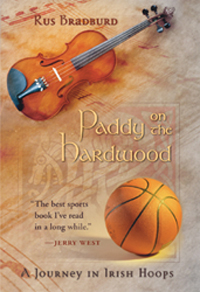Chicago Tribune's review of Paddy on the Hardwood
Tales of heroes, anti-heroes and other athletic characters.
Article from: Chicago Tribune (Chicago, IL) Article date:Dec 31, 2006
Byline: Dan McGrath
"Paddy on the Hardwood: A Journey in Irish Hoops," by Rus Bradburd; University of New Mexico Press ($24.95)
Rus Bradburd had a hard time accepting he was burned out on basketball. It hadn't been a game to him as much as it had been his life, and the gnawing realization that it didn't love him back resulted in almost unbearable heartache.
After some three decades as a Chicago playground devotee, small-college walk-on and major-college assistant coach, Bradburd felt his career was foundering, headed toward a path he had no desire to follow. He decided he had to get away, and he chose Ireland as a destination, not because it was remote and distant but because it offered opportunities to play music, write and sample other diversions that might keep his mind away from the love that had jilted him.
How wrong he was. Before he had unpacked, Bradburd found himself coaching the Tralee Tigers, a club team that competes in what passes for professional basketball in the Emerald Isle. His two-year tour became an engaging voyage of self-discovery that Bradburd artfully transformed into "Paddy on the Hardwood," a delightful memoir that will have you pulling for the scruffy Tigers as ardently as you might have for the elegant Bulls in their heyday.
They even have their own Jerry Krause-like character, a curiously endearing fellow named Junior Collins, Bradburd's self-appointed Sancho Panza who is guaranteed to steal the movie if the book ever becomes one.
There's a revolving cast of players, some of them talented, most of them earnest, a few toting the same sort of baggage that kept Bradburd awake nights during the 14 years he spent as a high-level college assistant.
There's a never-ending struggle for gym time, attention, support _ myriad logistical challenges the coach of an American high school team might take for granted, let alone a pro coach.
And there's William Main, gentle-souled chairman of the Tigers' sponsoring organization, a former priest who ardently believes no problem is insurmountable as long as he who confronts it gives 110 percent.
Coach Bradburd is a little more skeptical. But he addresses those and other feelings with wit, candor and insight that inform and energize his deft writing. If, as Bradburd suggests, he went to Ireland to "learn" the craft, he's an amazingly quick study.
Once Bradburd got them on the floor, the Irishmen were tough, vigorous competitors. "They'd play with their ears bleeding," Bradburd said in an interview. Getting them on the floor was another matter. "They might miss a game because their cousin's brother-in-law's baby was being christened."
And the floor itself was part of a Tralee "sports complex" that from Bradburd's description calls to mind a creaky old middle-school gym, down to its wooden backboards. Showers? Ah, not every night.
Facilities were but one drawback to attracting and retaining players. Money was another; while the Irishmen were a volunteer labor force, playing for the glory of old Tralee, the American imports were paid. A pittance, really, at the low end of the European scale, to say nothing of U.S. basketball wages, so it was not uncommon for Bradburd's best players to pack up and head elsewhere at the mere hint of a better offer.
All of which made keeping the team together and surviving the first season a monumental challenge. Bradburd felt enough gratification from meeting it that he returned for a second year, which ended far more successfully, so much so that TV cameras were there to record it _ the first half of it, anyway.
Only in Ireland, Bradburd ruefully concludes, could he find such a captivating tale, and only a writer with Bradburd's skill and touch could tell it so well.
"Paddy on the Hardwood" was the best book I read in 2006.
